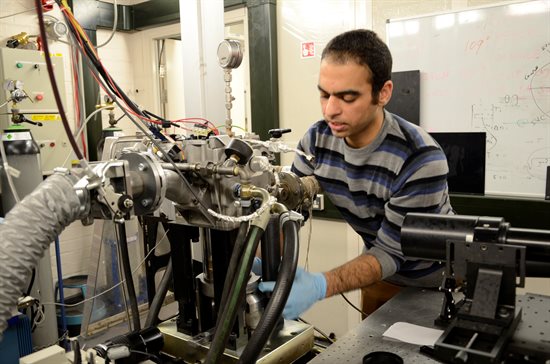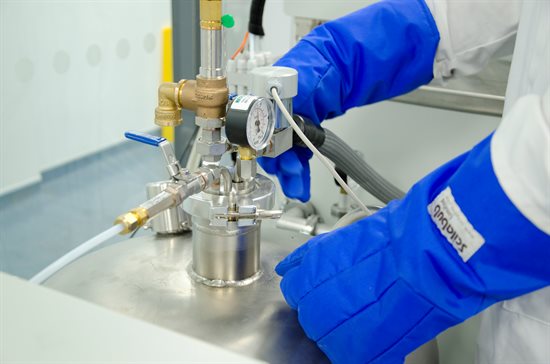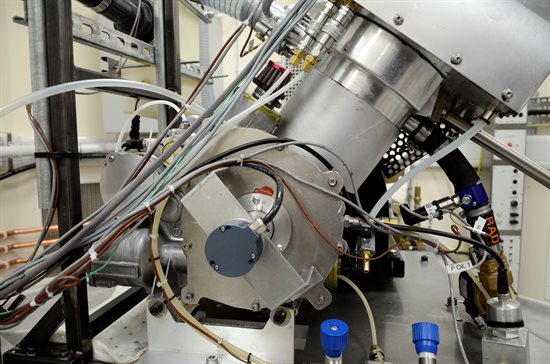The Vehicle and Engine Technology Research Centre in the School of Mechanical Engineering has a world-leading research profile in combustion engines and low carbon vehicle technology. The reduction of fuel consumption is currently the number one priority in engine and vehicle development. We work closely with UK industry in engine architecture and advanced engine technologies, helping to design the engines and fuels for the future; including hybrid powertrains.
 Next generation renewable fuels, including biodiesel, can be manufactured from biomass. These new formulations have a global consumption in excess of 100 billion litres per year. Our research has helped manufacturers to understand the impact of fuel properties and take advantage of thermos-chemical recovery processes for fuel reforming. We are supporting the development of new engine technologies that are fuelled by carbon free energy carriers such as ammonia and liquid nitrogen/air.
Next generation renewable fuels, including biodiesel, can be manufactured from biomass. These new formulations have a global consumption in excess of 100 billion litres per year. Our research has helped manufacturers to understand the impact of fuel properties and take advantage of thermos-chemical recovery processes for fuel reforming. We are supporting the development of new engine technologies that are fuelled by carbon free energy carriers such as ammonia and liquid nitrogen/air.
The School of Metallurgy and Materials is leading in research into novel materials for aerospace applications, to minimise energy use in the manufacturing process and reduce weight and fuel consumption of aircraft whilst in the air.
Facilities
Our research facilities are regarded as some of the best academic facilities in Europe, which house ten engine test cells for the development of engines and fuels; including next generation engine control methodology, biofuels and catalysts. The Centre also has facilities for experimental studies of tyre and vehicle dynamics, and it is currently involved in the development of low rolling resistance tyres.
In collaboration with the Birmingham Centre for Cryogenic Energy Storage, we have new laboratories funded by the Engineering and Physical Sciences Research Council (EPSRC) and industry to help establish a UK cryogenic engine research and development base. These facilities are enabling UK companies to test and develop new components and system, increase their understanding of tribological systems at lower temperatures than traditional combustion engines, and establish themselves as market leaders in this potentially revolutionary technology.
 Our experimental work is supplemented by advanced computational facilities and the latest commercial software used by industry; enabling research of the highest calibre our in tandem with industrial partners. This is delivering greater fuel efficiency and the reduction of emissions such as nitrogen oxide, particulate matter and carbon dioxide. We carry out extensive collaborative work with the likes of Jaguar Land Rover, Johnson Matthey and Shell.
Our experimental work is supplemented by advanced computational facilities and the latest commercial software used by industry; enabling research of the highest calibre our in tandem with industrial partners. This is delivering greater fuel efficiency and the reduction of emissions such as nitrogen oxide, particulate matter and carbon dioxide. We carry out extensive collaborative work with the likes of Jaguar Land Rover, Johnson Matthey and Shell.
 Changing the way fuel is injected into the cylinder can improve both combustion and engine performance. Our facilities for new combustion modes include a full optical engine in which it is possible to apply world-leading optical diagnostic analytical techniques to assess fuel injection, mixture preparation and combustion processes.
Changing the way fuel is injected into the cylinder can improve both combustion and engine performance. Our facilities for new combustion modes include a full optical engine in which it is possible to apply world-leading optical diagnostic analytical techniques to assess fuel injection, mixture preparation and combustion processes.